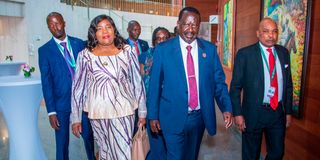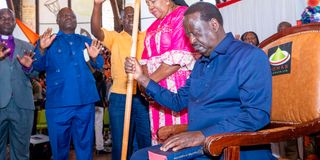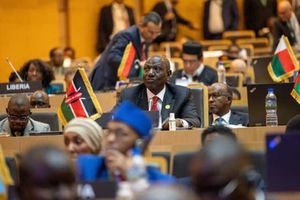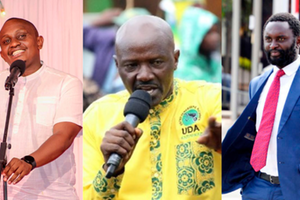
Raila Odinga with his family and Makau Mutua at AUC Headquarters shortly after the election.
Some people wrestle with their destiny. Others try hard to tip the balance of fate. Yet others try to do both.
On February 15, 2025, former Prime Minister Raila Odinga tried to do both as he vied for the African Union Commission (AUC) Chairperson position.
Like a man engaged in a duel with fate, he had been pushed onto a big continental stage, and we could hear the clash of steel in a taut, heart-wrenching match — the swords zapping and cutting through the air.
For Mr Odinga, elections always raise his hopes. I imagine him confident the day before the election, with friends on a street in Addis Ababa, laughing while they drank Ethiopian coffee or peppermint tea at a fancy restaurant with the smoky-salty scents of the Ethiopian delicacies of injera, kitfo and doro wot filling the air, the coffee machines hissing and gurgling, and the sun hitting the wall tiles with a pallid shade through the windowpanes of the café — a cosy enclave in the middle of the Central Business District.

Raila Odinga at prayers organized by ODM Women ahead of Africa Union Commission elections held of Saturday in Addis Ababa.
It was a day as perfect as paradise as Mr Odinga expected to win the AUC position the next day.
However, on February 15, 2025, like in a frightening horror movie, he lost the position to Djibouti’s Mahamoud Ali Youssouf. Mr Odinga had worked tirelessly, with days of homeless wandering as he flew from one country to another in his campaigns — days of passing anonymously and unrecognised through dusky airport terminals. After another election loss, everything was scattered; the forms of things, the memory of things and the tears of things.
This reminds one of the famous Latin phrase lacrimae rerum translated as “tears of (for) things” from the famous book Aeneid by Roman poet Virgil.
String of losses
For Mr Odinga, a man who has accumulated a string of losses in life, he has tears “for” many things. He is like a man wandering in the land of lost things, one used to standing alone in the midst of ruins after every earthquake of loss, with things broken and blown over everywhere. However, no matter how painful every loss he suffers, he trudges on.
Also Read: AU loss aside, Kenya still tops Africa
Mr Odinga is also a dreamer, an incurable romantic. As a romantic, one of the songs he has publicly sung is Jamaica Farewell by Harry Belafonte, “Down the way/Where the… sun shines daily on the mountaintop/I took a trip on a sailing ship/And when I reached Jamaica I made a stop/But I'm sad to say I'm on my way/Won't be back for many a day/My heart is down/My head is turning around/I had to leave a little girl in Kingston town”.

Raila Odinga at the AU headquarters in Addis Ababa on February12, 2025.
Like the man who “took a sailing ship” to Jamaica, Mr Odinga is also a man of adventure, of trips and voyages — seeking the thrill of elsewhere.
And like all romantics, it is never about the destination but the journey. As one romantic, the American writer Bill Hayes, once wrote, “Taking wrong trains, encountering unexpected delays, and suffering occasional mechanical breakdowns are inevitable to any journey really worth taking”.
Mr Odinga reminds one of Hemingway’s novella, The Old Man and the Sea where another old man (Santiago) dreams of a special journey. “I promise to make a pilgrimage to the Virgin of Cobre,” he says wistfully.
The pilgrimage never happens because Santiago says, “In the night I spat something strange and felt something in my chest was broken.” The Old Man and the Sea tells the story of Santiago, an aging fisherman, and his long struggle to catch a giant fish.
In many ways, Mr Odinga is like the character Santiago. Like Mr Odinga, Santiago is an old man wresting with a wreckage of his past, a man who knows what it means to lose and what it means to return home empty-handed and sad. Mr Odinga knows what it means to return home empty-handed especially as he flew back from Addis Ababa to Nairobi after his latest loss.
Another way in which Mr Odinga and Santiago are similar is that, like Mr Odinga, there was a time when Santiago was “El Campeón”, “The Champion”, a time when Santiago got this nickname due to his victory “in a long and arduous arm wrestling match when he was younger; it serves as a reminder of his past strength and determination even as he faces challenges at sea”.

President William Ruto (left) and Raila Odinga at the African Union Commission headquarters in Addis Ababa, Ethiopia, on February 15, 2025.
Like Santiago, Mr Odinga is known for his exploits in his younger (and maybe happier) days, as he fought to entrench democracy in Kenya.
Why does Mr Odinga (and Santiago) keep doing this? Why can’t they just give up? Why can’t they retire? The answer to this could come from what a boy tells Santiago in the novella, “Que va,” the boy said, “It is what a man must do.”
Both Mr Odinga and Santiago have a deep purpose pushing them on, they can’t stop or quit — it is what they must do.
Mr Odinga is a strong man but not untouched by sorrow. Like in his beloved lyrics from Jamaica Farewell, his heart is down, and his head is turning around but he keeps showing up, loss after loss. Whatever our views of the son of Jaramogi, he is an inspiring man who fights hard for what he believes in.
The writer is a book publisher based in Nairobi. [email protected]









